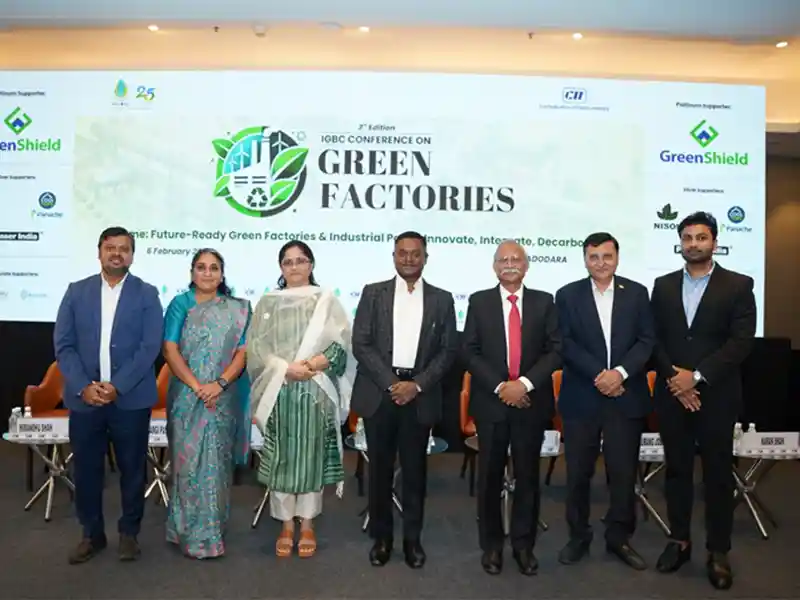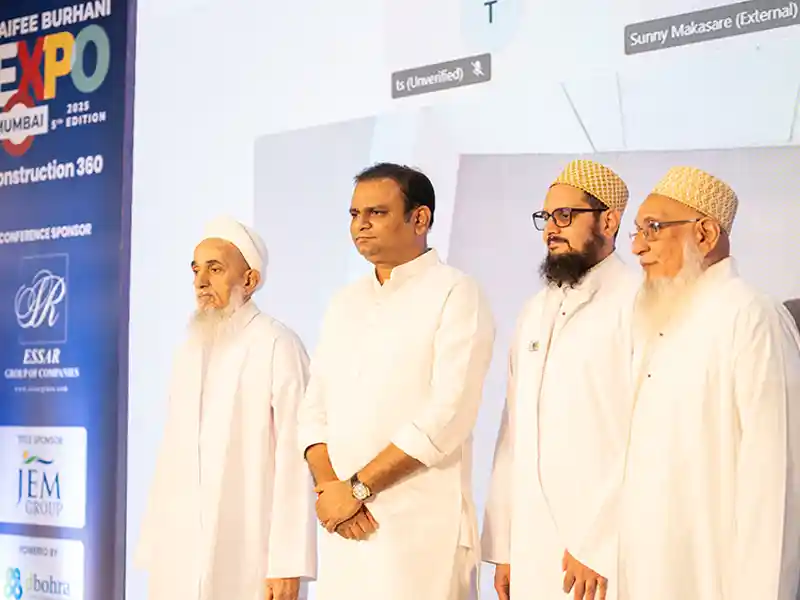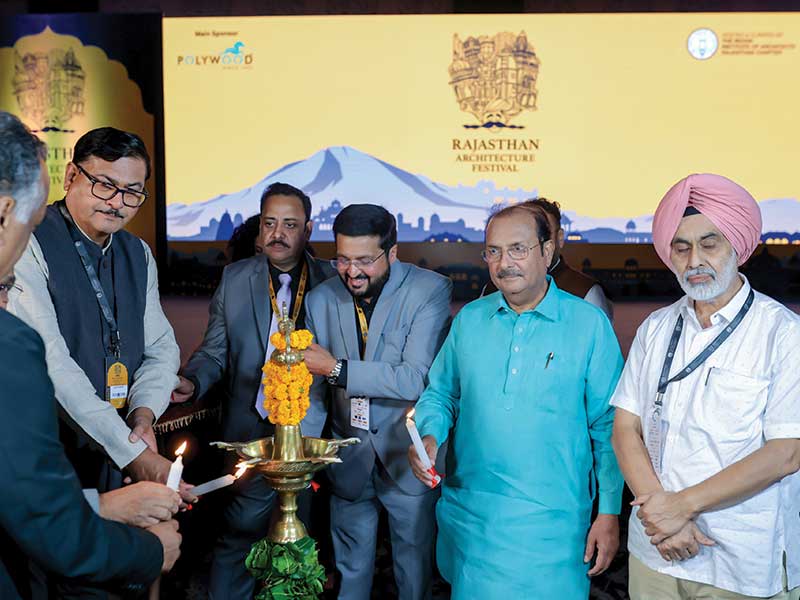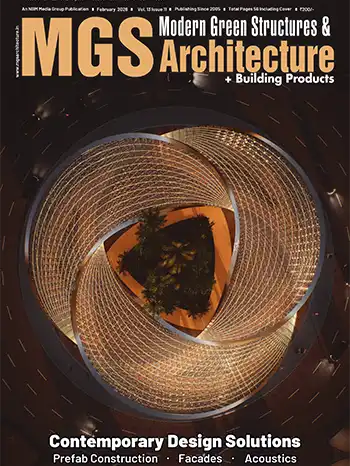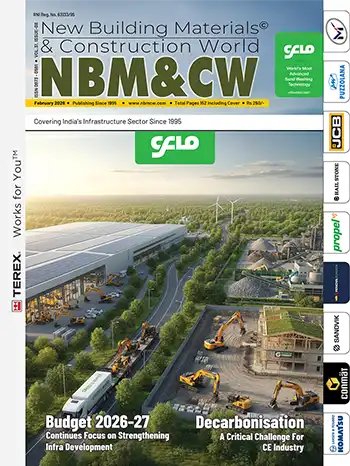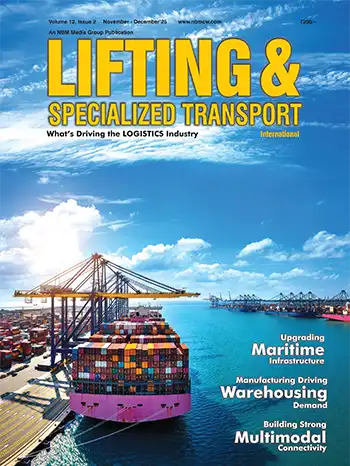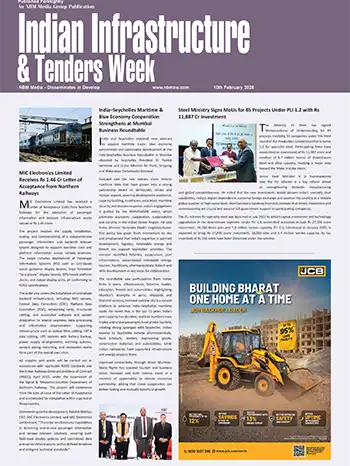
The Confederation of Indian Industry - Indian Green Building Council (CII-IGBC) successfully hosted the 22nd edition of the Green Building Congress 2024, Asia’s largest conference and expo on the green built environment. The event took place from 14th to 16th November 2024 at the Bangalore International Exhibition Centre, Bengaluru. The theme “Advancing Net Zero in Buildings and Built Environment” aimed at advocating for the adoption of green building practices and certifications, to help reduce the environmental footprint of construction and urban development.
The Green Building Congress called for further policy reforms to achieve India’s goal of 50% renewable energy by 2030, including universal net metering, removing solar capacity limits, and reducing wheeling and green tariffs. It also urged updates to building codes to align with green and net zero norms, reducing costs for energy and water use. It also brought to the fore the progress of sustainable building practices in the country.
At the Expo, forward-thinking companies showcased their green products and materials for sustainable construction. Visitors had the opportunity to explore over 1,000 green building products and technologies for use in homes, offices, and commercial buildings.
Green Projects in India
India has been witnessing the greening of an impressive 12.816 bn sq.ft of built-up area through 14,680 registered projects adopting IGBC GREEN and Net Zero standards. The impact of these projects goes beyond sustainability to inspire innovation and community development, with over 150 projects already achieving the net-zero status.Among the states in India, Karnataka has been one of the significant contributors to India’s green and net zero building movement. The state boasts a registered green footprint of 1 bn sq.ft, with more than 1,120 projects aligning with IGBC’s green building standards. Karnataka ranks among the top four states in renewable energy development, with an installed capacity of 22.37 GW as of October 2024. Bengaluru, as the host city of this year’s IGBC Green Building Congress, reinforced its position as a hub for green innovation and sustainability leadership.

Observations
The event was graced by Shri Eshwar Khandre, Hon’ble Minister of Forest, Ecology and Environment, Govt. of Karnataka; Sharan Kumar Modi, Board Members, Karnataka State Pollution Control Board; Jamshyd N Godrej, Chairman CII-Sohrabji Godrej Green Business Centre; Jeff Oatman, Chair, Asia Pacific Regional Network WorldGBC; B Thiagarajan, National Chairman, Asia Pacific Regional Network World GBC; C Shekar Reddy, National Vice Chairman, IGBC; and, N Venu, Chairman, CII Karnataka State Council. The Green Building Congress brought together industry experts, policymakers, architects, builders, and sustainability advocates to discuss innovations, trends, and policies shaping a greener future in India and beyond.C Shekar Reddy, National Vice Chairman, IGBC, said, “The Expo featured 150 exhibitors showcasing advanced products and technologies, witnessed by 7,000+ visitors, raising awareness and building confidence amongst the stakeholders to embrace net zero solutions. I therefore urge all industry associations in the building and construction sector—CREDAI, NAREDCO, BAI, IIA, ICI, IIID, ISHRAE, and others—to collaborate and work towards the shared vision of a green and sustainable future for India.”
Dr Chandrashekar Hariharan, Chairman, IGBC Bangalore Chapter, said, “The Green Building Congress, which returned to Bengaluru after 18 years, is shaping India’s sustainability journey. The future of urban development lies not just in constructing buildings, but in creating spaces that are resilient, sustainable, and integrated with nature. This event exemplifies our collective determination to drive sustainable development and make net zero a reality.”
Commented Ar Anup Naik, Co-Chair, IGBC Bangalore Chapter, “At a time when our cities are expanding at an unprecedented rate, the opportunity to build with purpose has never been more critical. Green building is not just a trend—it’s a necessity, one that requires us to rethink how we design, build, and live in our urban spaces. By embracing sustainability at every level, from materials to energy, we not only enhance the quality of life today but also lay the foundation for a thriving tomorrow.”
Experts, policymakers, and innovators emphasized that achieving net-zero goals requires robust policy frameworks and regulatory support. Sessions like “Renewables for Buildings and Built Environment” and “Enabling Policies and Regulations for Achieving Net Zero” explored how government initiatives, public-private partnerships, and financial incentives can accelerate the adoption of sustainable practices.
The event also featured IGBC Green Your School Competition with an overwhelming response of 400+ schools across the country along with IGBC Green Design Competition, themed “Vibrant Urban Voids: Endless Possibilities,” encouraging students to transform neglected urban spaces into vibrant public areas.
IGBC felicitated 21 winners of the IGBC Performance Challenge Award for Green Buildings & Built Environment 2024. This award is given to IGBC certified green building projects which continue to maintain the facility as green. CII IGBC bestowed 6 IGBC Senior Fellows and 23 IGB Fellows awards to corporate leaders who are playing an important role in leading the Green Buildings movement in India.

CII IGBC’s Mission on Net Zero envisions that all greenfield projects should go net zero carbon by 2030, and both green and brownfield projects should go net zero by 2050. Its Net Zero Carbon Rating System promotes the use of low-embodied carbon materials and technologies and on-site / off-site renewable energy sources, and adherence to a Whole Building Life Cycle Analysis. The rating system addresses projects in both ‘Design & Construction’ and ‘Operations’ phases. This approach allows tailored strategies for minimising or eliminating carbon emissions at different project stages.
The Green Building Congress brought together architects and designers, builders and developers, corporate and academia, representatives from the government and international agencies, and green product manufacturers. The event is supported by WorldGBC in India. 18 Green Building Councils from across the globe supported and shared similar goals to develop a unified strategy to help achieve Net Zero goals and engage stakeholders from the building and construction industry.
Panel Discussions
Brainstorming sessions held at the event saw panellists emphasizing the importance of incorporating sustainability into green infrastructure development. Participating companies welcomed the government’s move to provide incentives and subsidies to those using sustainable materials in construction.Discussions were held on India’s strategic initiatives and innovations for sustainable development, underscoring the nation’s leadership and growth potential in achieving net-zero emissions. The Master Speaker session presented perspectives from leading architects on the design and implementation of net-zero buildings, focusing on strategies for achieving energy efficiency and sustainability, and innovations shaping the future of sustainable architecture.
A panel discussion on Development of Ecosystem for Net Zero explored collaborative efforts to create a sustainable ecosystem, including policy frameworks, technological innovations, public-private partnerships, and financial investments. Discussions were held on building supportive infrastructure for industries, governments, and communities to transition towards net-zero emissions.
A session on Smart Technologies – Enhancing Building Intelligence explored how advanced systems utilizing automation and AI improved energy efficiency, security, and comfort in buildings. It also examined the use of Digital Twins and BIM technologies to create virtual models for better monitoring and maintenance. A session on Roadmap for Achieving Net Zero in Building and Built Environment explored strategic approaches and collaborative efforts to achieve Net Zero in the built environment, innovations, policies, and international partnerships driving sustainable development.
Developing effective strategies for organizations to advance their sustainability goals and achieve Net Zero goals were discussed during a session on Pathways to Net Zero – Organizational Strategies. Emphasis was on planning and implementing resilient business practices and innovative policies to mitigate environmental impacts, drive meaningful change, and ensure long-term sustainability in the face of climate-related challenges.
A panel discussion on Net Zero: Global Perspectives explored international strategies, policies, and innovations for achieving global net-zero goals, highlighting the challenges and opportunities. Also discussed were principle of circular economy and its transformative impact on architecture, and how circular practices were being implemented on various scales in the built environment. During Net Zero Innovators, leading innovators in the net-zero movement, highlighted cutting-edge technologies and solutions with successful case studies that drove progress towards achieving carbon neutrality.
A discussion on Green Financing – Green Bonds & Carbon Markets drew forth information on integrating green financing mechanisms into mainstream financial practices, raising awareness on green bonds, the challenges and opportunities in carbon markets, and how financial tools can support sustainable development.
Climate Resilience – Adapting to Change drew forth strategies for cities to adapt to climate change, emphasizing planning and implementing resilient infrastructure and policies to protect urban areas from climate-related challenges.
A conference on Renewables for Buildings and Built Environment emphasized sustainability as a lifestyle approach, fostering responsible consumption, resource conservation, and environmental protection. It underscored the importance of making choices that can positively impact the planet and future generations.
The session on Role of Women for a Sustainable Future celebrated women’s pivotal role in sustainability, including managing natural resources, advocating for environmental protection, and leading community-driven conservation efforts. Discussions highlighted women’s contributions to sustainable architecture, biodiversity preservation, water conservation, and climate change adaptation. Panellists emphasized how women’s leadership and entrepreneurship can drive the green economy through eco-friendly businesses and inclusive policies, underscoring that empowering woman can lead to equitable and sustainable outcomes.
India’s commitment to achieving Net Zero by 2070 present vast opportunities in renewable energy expansion, green infrastructure development, and sustainable industry practices. By leveraging innovations in clean energy, electric mobility, and green finance, India has demonstrated its potential to play a pivotal role in global climate leadership.
Government of Karnataka Leads in Green Architecture & Construction
The Government of Karnataka is driving renewable energy growth through its Renewable Energy (RE) Policy 2022-2027, supporting both state and national goals to help India achieve 500 GW of renewable energy by 2030. Karnataka ranks among the top four states in renewable energy development, with an installed capacity of 22.37 GW as of October 2024.
Karnataka is also the state partner for the CII IGBC Green Building Congress 2024. Through the ‘State Climate Action Plan, Beyond Bengaluru,’ the state aims for Net Zero in waste, water, energy, and carbon. Karnataka promotes environmental protection and climate resilience through key initiatives:
- Green Index for Sustainable Infrastructure evaluates projects on sustainability, considering factors like energy efficiency, recycled materials, and pollution control.
- The Bengaluru Climate Action and Resilience Plan (BCAP) targets net-zero emissions by 2050, focusing on energy, transportation, waste, water, and urban planning.
- The State Action Plan on Climate Change (KSAPCC) addresses environmental challenges, with a Rs. 52,827 crore investment in afforestation, water management, and corporate climate action through CSR.
- The KHIR City project, a Rs. 40,000 crore urban development near Bengaluru, aims to create a sustainable city with eco-friendly housing, advanced transportation, and green spaces, generating one million jobs.
Jamshyd N Godrej, Chairman CII-Sohrabji Godrej Green Business Centre, laid stress on the importance of managing carbon emission produced by the building sector which is responsible for 37% of global carbon emissions, making it important to address both operational and embodied emissions. He also emphasized transparency in emissions data and stronger partnerships across the value chain which are crucial for achieving net-zero goals. “IGBC has launched a Green Cooling Council which will involve all the relevant stakeholders in the industry and brainstorm on what we should do to reduce the emissions on account of the existing cooling systems as well as the upcoming cooling systems.”
B Thiagarajan, National Chairman, IGBC, informed that IGBC is at the forefront of promoting sustainable development in India’s building sector. It is addressing the significant rise in resource consumption and emissions as the country adds an estimated 8-10 billion square feet annually in new commercial and residential spaces by 2030. To combat this, IGBC has launched targeted initiatives aimed at achieving Net Zero in energy, water, waste, and carbon across the sector, working closely with stakeholders to create a lasting impact.
 Larsen & Toubro’s Chennai Technology Centre – 4 made history at the Green Building Congress by becoming the first to receive the IGBC Net Zero (Design) Certification for Net Zero Energy, Carbon, Near Net Zero Water, and Zero Waste to Landfill. The building achieved 28.7% reduction in embodied carbon by diverting 92.5% of construction waste from landfills and using 57% green materials. Operational carbon was reduced through a 250 kWp rooftop solar PV plant and a water use performance ratio of 0.78.
Larsen & Toubro’s Chennai Technology Centre – 4 made history at the Green Building Congress by becoming the first to receive the IGBC Net Zero (Design) Certification for Net Zero Energy, Carbon, Near Net Zero Water, and Zero Waste to Landfill. The building achieved 28.7% reduction in embodied carbon by diverting 92.5% of construction waste from landfills and using 57% green materials. Operational carbon was reduced through a 250 kWp rooftop solar PV plant and a water use performance ratio of 0.78.“With an ambitious goal of greening 2 billion square feet each year, IGBC’s efforts could yield substantial annual savings, including 104 billion units of energy, 320 billion litres of water, and a reduction of 83.2 million tons of CO2 emissions. These sustainability efforts are further bolstered by a focus on green investment, which incentivizes sustainable practices, accelerates green job creation, and aims to lower costs in green construction.”
“IGBC’s leadership highlights the building sector’s crucial role in steering India toward a greener, more sustainable future, with a vision that encompasses environmental responsibility, economic opportunity, and the long-term well-being of communities across the country. CII IGBC’s Net Zero Carbon Rating encourages low-embodied carbon materials, optimized building performance through passive features, and the use of renewable energy and carbon sequestration to offset emissions.”
By bringing together industry experts, policymakers, and practitioners, the event served as a platform to exchange ideas, showcase innovative solutions, and strengthen collaborative efforts, setting the groundwork for accelerating and ensuring a more sustainable future for India.

